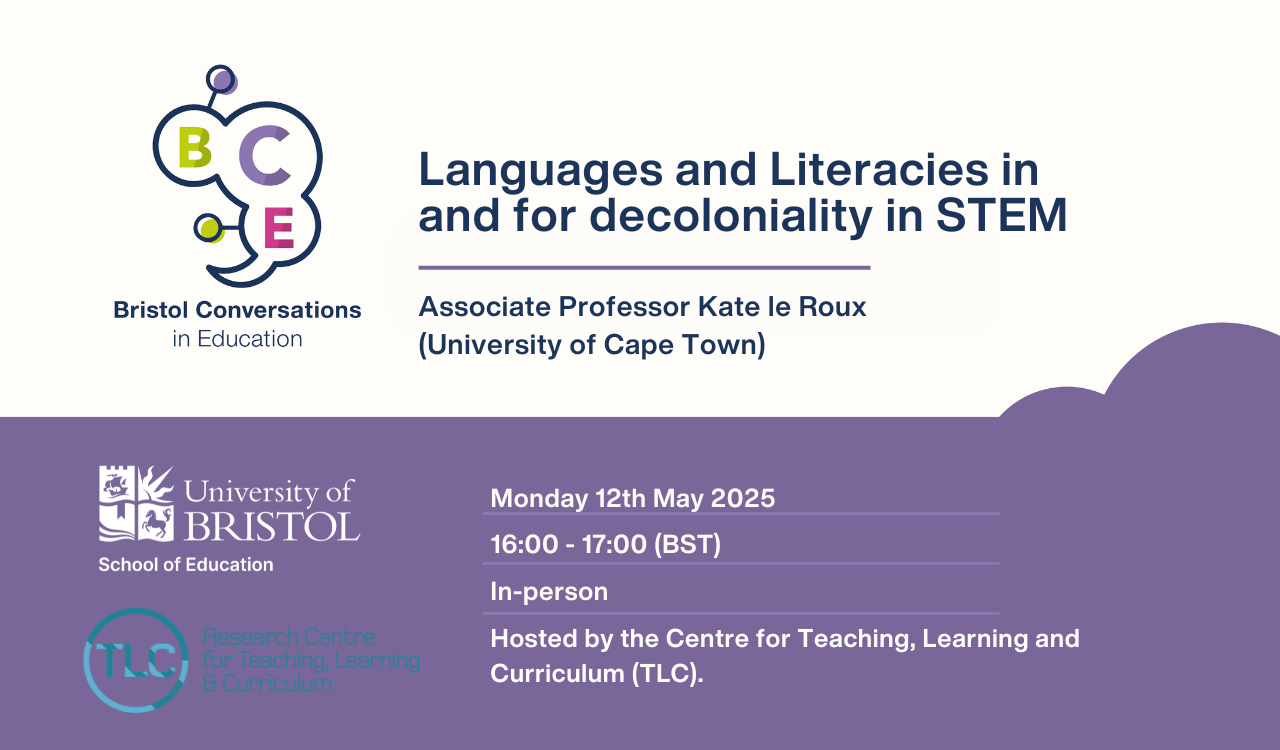Languages and Literacies in and for decoloniality in STEM
Associate Professor Kate le Roux (University of Cape Town)
In-person. Information on how to attend will be found at the end of your order confirmation email.

Event information
Languages and Literacies in and for decoloniality in STEM
Monday 12th May 2025, 16:00-17:00 (BST)
This event is part of the School of Education's Bristol Conversations in Education research seminar series. These seminars are free and open to the public.
Venue – In person. Information on how to attend is found at the end of your order confirmation email.
Registration - Sign up for this event on the Eventbrite page.
About the event
Host: Centre for Teaching, Learning and Curriculum (TLC)
Speaker: Kate le Roux (Associate Professor in the Language Development Group, Academic Development Programme, University of Cape Town)
Languages and literacies are central for accessing, learning, communicating, and transforming knowledges. Hence, they have been and are put to work as the ‘root’ of coloniality, (re)producing - through slow violence - related linguistic, ontological, epistemic, social, economic and ecological injustices, for individuals and society.
Yet viewing language as the root of something named ‘coloniality’, hints at the hope of ‘decoloniality’, and that languages and literacies may be central to (re)designing what knowledges, and ways of knowing, being and valuing have legitimacy in higher education.
These are some of the ideas from decolonial-oriented thought that I bring to my collaborative research and curriculum development with STEM lecturers at the University of Cape Town. Pervading our work are questions of what knowledges, for whom (student, society, the Earth; in South Africa, Africa, in a globally connected world), how it is taught, and using what languages and literacies.
In this presentation I talk as someone raised, educated and working in spaces structured by an Anglonormative coloniality. I share key concepts, grounded in the above-mentioned decolonial thought, that I bring to these collaborations. Using these concepts to think and talk about our curriculum design and implementation, we experience taking our education practice beyond reflection to a more systemic, critical, reflexive praxis. Drawing on examples of ongoing, collaborative innovations in undergraduate mechanical engineering, I describe and offer some explanations for both the possibilities and challenges of using languages and literacies as pivots for decoloniality.
Kate le Roux is an Associate Professor in the Language Development Group, Academic Development Programme, at the University of Cape Town (UCT).
Her research, teaching, education development, and leadership are located in the interplay of languages, literacies, and mathematics in STEM disciplines.
She draws theoretically and methodologically on critical thought in mathematics education within the socio-political and socio-ecological, languages and literacies; and a Southern knowledges approach to decoloniality. With a deep commitment to democratising knowledge and knowledge production, she is curious about issues of equity, access, power, justice, (re)design, relations, and place in multilingual contexts.
Kate was awarded a PhD in Mathematics Education by the University of the Witwatersrand in 2011. She was a Mandela Mellon Fellow at the Hutchins Center for African & American Research at Harvard University in 2014. Currently, she is co-chairing - with Prof. Alf Coles at the University of Bristol - the International Commission on Mathematics Instruction (ICMI) Study 27, ‘Mathematics Education and the Socio-Ecological’, and holds a Senior Fellowship on the UCT-Bristol Collaboration Programme.